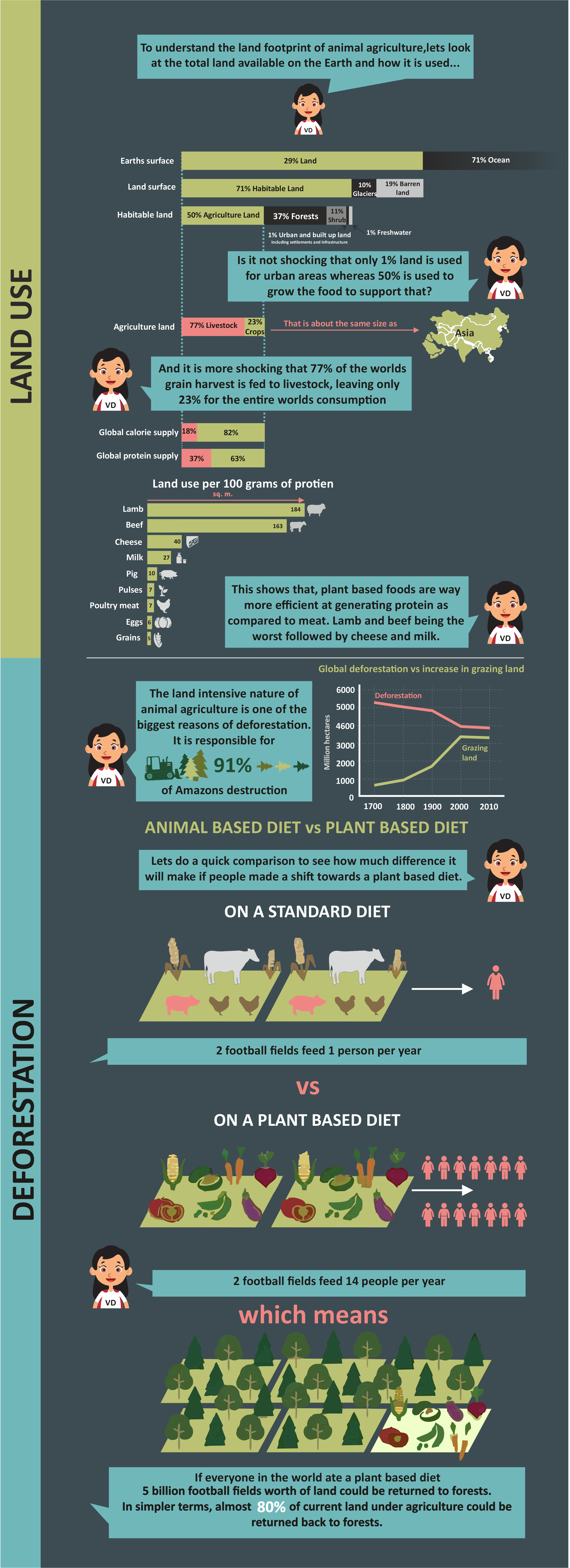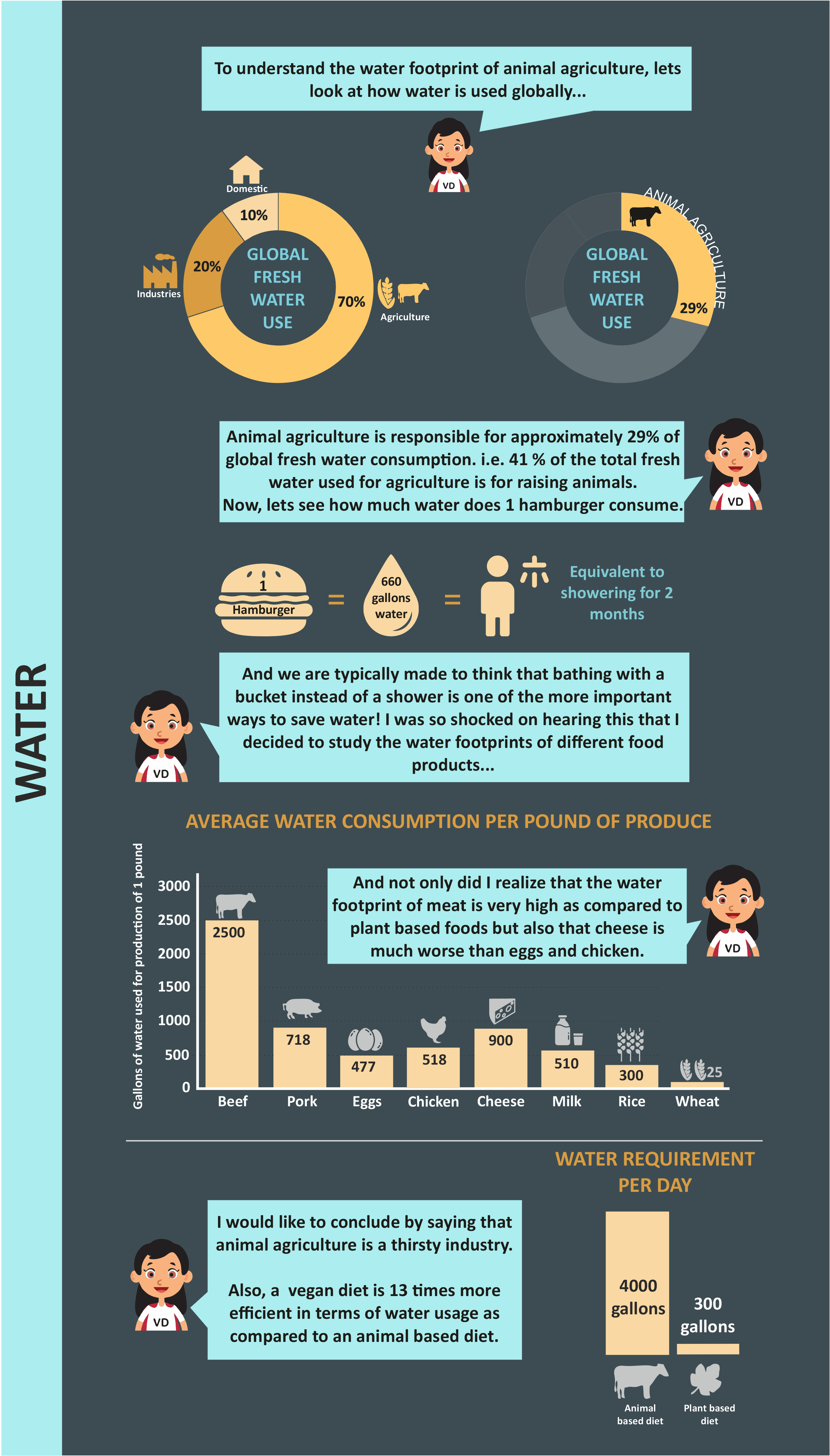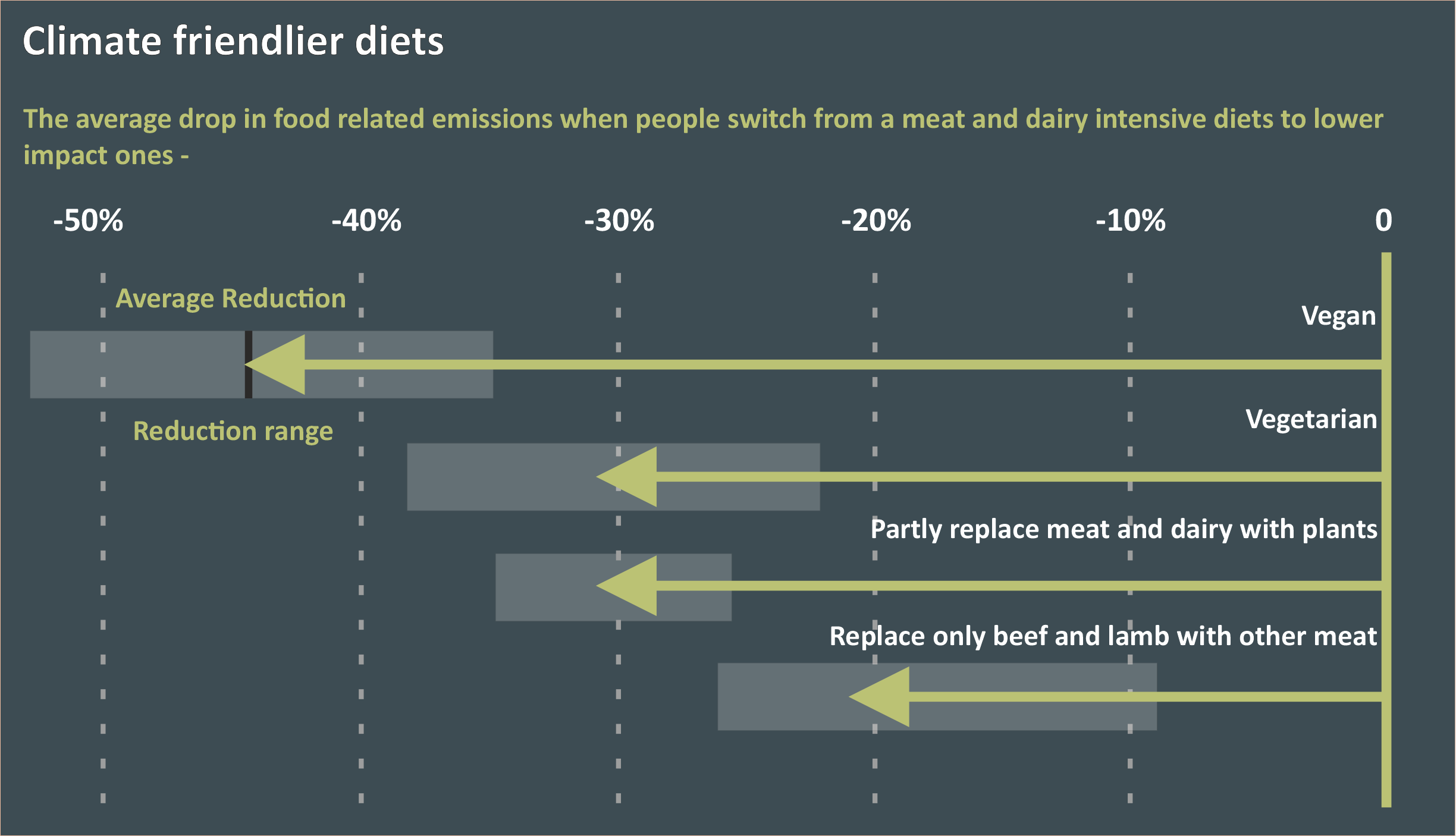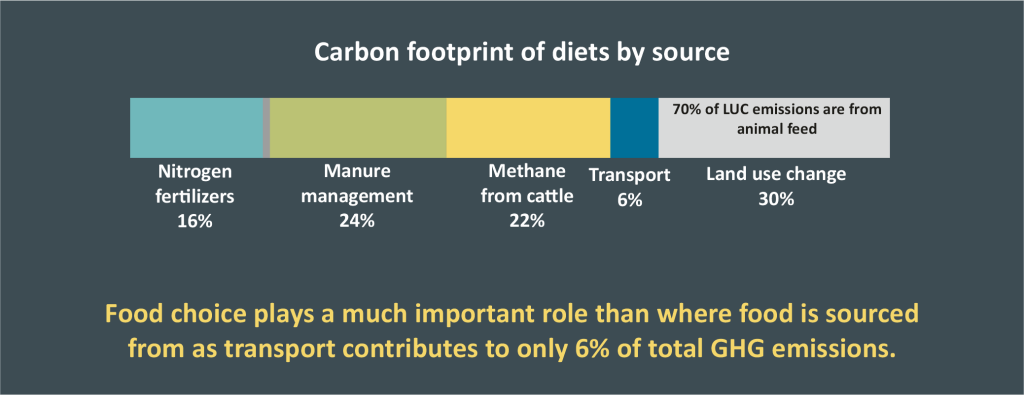Today our environment is in serious trouble. We are in the midst of terrible ecological devastation and mass extinction.
In a landmark UN report, 2018, the world’s leading scientists warned that there are just twelve years to keep global warming under 1.5 celsius or we significantly worsen the risks of drought, floods, and other extreme temperature changes.
Twelve. Years. Two of which are already gone.
That timeline is shocking. Generally speaking, conversations about climate change usually end up including fossil fuels. Mentioned far less are the ways that animal agriculture contributes to the changing climate. Confused?
Ten thousand years ago, 99% of biomass (i.e. zoo mass) was wild animals. Today, humans and the animals that we raise as food make up 98% of the zoo mass. Raising animals for food is the single greatest human-caused source of destruction to our environment.
Land and Rain forests
Animal agriculture is very land intensive. Of all the roles trees play in climate change, their role as carbon sinks might be the most important. A carbon sink is anything in nature that holds or stores more carbon that it releases, like trees. They manage this by acting like a sponge and soaking up carbon and other greenhouse gases that would otherwise be free and wrecking havoc on climate patterns. But animal agriculture is the biggest industry leading to deforestation.

Greenhouse gases

Water

Waste

Oceans
The fishing industry affects a number of marine conservation issues, including: fish populations, water pollution, and habitat degradation.

The fishing industry needs to be significantly decreased in order to maintain healthy marine environments around the world. Oceans of the world may be fish-less by 2048, and irresponsible fishing practices are being held as one of the major culprits behind this potential disaster.
One of the most detrimental techniques is bottom trawling, in which fishermen drag a net along the bottom of the ocean floor. It disturbs the bottom of the seabed, stirring up significant amounts of sediment and damaging the coral species which is a vital component of healthy ocean ecosystems as it provides shelter to a number of deep sea-dwelling species. The sediment that is brought up from the bottom of the ocean floor can be carried along by currents, reaching areas of the ocean located miles away. An overabundance of sediment creates murky waters, blocking sunlight from reaching underwater plants and creating dead zones of oxygen deficiency. Additionally, many of the organic pollutants that have settled into the sediment are stirred back up and reintroduced to the food chain, beginning with plankton and moving up to humans. The UN has estimated that up to 95% of global ocean damage is a direct result of bottom trawling. Blast fishing and cyanide fishing are two other practices that are detrimental to marine habitats. In blast fishing, fisherman use explosives to kill large quantities of fish. The explosives do more than kill the fish, however, and also cause destruction to underlying habitats such as coral reefs. Cyanide fishing is a similar practice, but uses cyanide to kill large quantities of fish. Fishermen spray this poison throughout coral reefs, Then collect the stunt fish and place them in freshwater for roughly two weeks. The fresh water is believed to cleanse the fish of any remaining cyanide. In many places, these practices are illegal, yet continue to be used.
FAQ
What if everyone starts eating only plants? That will also lead to increase in the agricultural land requirement and lead to deforestation etc.
No, it wont. Raising animals is very resource intensive as opposed to cultivating crop for direct human consumption. Animal based diet is 16 times more resource intensive than a vegan diet, whereas a vegetarian diet is 3 times more intensive. Hence, if everyone in the world ate a plant based diet even after factoring the increase in demand of land for human crops we will be able to return almost 80% of the total land today under agriculture to the forests. (Assuming, the level of global calorie intake stays the same)
How much would changing my diet actually help? I am just one person! Can I really make a difference all by myself?

As you can see, it would definitely make a big difference if the world’s heaviest meat eaters scaled back even moderately, helping to free up land to feed everyone else. If many people collectively made changes to their diets, it will add up.
Why is animal agriculture resource intensive?
Instead of directly eating plants and getting our nutrients from there, human as usual tend to do it through animals who themselves get their nutrients from plants. Animals eat large quantities of grain, soybeans, oats and corn; however, they only produce a comparatively small amount of meat, dairy products, or eggs in return. An animal’s efficiency to turn its food into body mass known as feed conversion ratios (FCR) (i.e. feed: meat). The range of FCRs is according to Dr. Robert Lawrence of Johns Hopkins University, the ratios are approximately 7:1 for beef, 5:1 for pork and 2.5:1 for poultry. The larger the animal, the larger the percentage of that animal’s body mass is inedible material like bone, skin and tissue. The second reason for meat production’s great resource intensity is due to its immense scale. Globally, there is a projected “food animal” population of over 20 billion, almost thrice that of the current seven billion humans the planet carries, with the animal count expected to rise along with human population growth. It all adds up.
What about grass fed beef and free farms?
Most cattle spend their first year on pastures eating grass, after which they are typically moved to a feedlot, where they are fattened up with grain. By contrast, “grass-fed” cattle keep grazing on grass until they are slaughtered. But, on the flip side, grass-finished cattle which are not given antibiotics etc. also take longer to reach slaughter weight, which means they spend more time burping up methane into the atmosphere. Because of this, some studies have suggested that grass-fed beef can actually be worse for the climate over all.
Is organic produce better than conventionally grown produce?
Organic produce is grown without synthetic fertilizers or pesticides, which is definitely good for your health. But that doesn’t mean it’s necessarily better from a climate perspective. In some cases, it can be a bit worse as organic farms often require more land than conventional farms.
Should I worry about whether my produce is local and seasonal?

Transportation accounts for only about 6 percent of food’s total climate footprint. Anything that’s in season where you live, whether you buy it at a local farmers’ market or at a supermarket, is usually a good choice. Things get trickier when it comes to out-of-season produce. Some fruits and vegetables that are shipped by plane can have a surprisingly hefty carbon footprint. In some cases, though, there can be an advantage to food that’s shipped in from elsewhere grown in its natural environment than to buy a local variety that was grown in an energy-intensive heated greenhouse.
Also, many believe that air-freight is more common than it actually is. Very little food is air-freighted; it accounts for only 0.16% of total transportation involved in the food supply chain, as most foods are transported by ships. Many of the foods people assume to come by air are actually transported by ships – avocados and almonds are prime examples and crops even when shipped at great distances, its emissions are much less than locally-produced animal products.
Even almonds are very water intensive. Is’nt that bad for the environment?What is the environmental impact of different types of milk?
Yes, almonds are more water intensive as compared to other nuts and grains. But even they use 50% of water per litre as compared to milk from cows.
This graph is a good representation of the environmental impact of different types of milk, per liter.

Why aren’t governments speaking more openly about how harmful animal agriculture is for the environment? How come we have never heard of this before?
Reducing your carbon footprint by eating less meat and dairy rarely gets attention. This strategy has been recommended by the UN’s Food and Agriculture Organization and a host of other highly-regarded researchers and organisations.
Industry and lobby groups have traditionally had much economic and political power. They push heavy consumption and meat marketing campaigns which target our insecurities, attempting to convince us our brain development is linked to hearty meat intake. Governments under the pressure of these lobbyists and capitalists aren’t acknowledging this openly or making policies that could aid in this shift.
Religious and cultural associations are definitely there as well. It is a difficult shift to make mentally and it appears we don’t want to be put off our food by acknowledging the implications of our diet. And hence, as we say, ‘Ignorance is bliss!’
I would like to conclude this answer by quoting a speech given by Greta Thunberg a climate activist who is only 17 years old –
We are about to sacrifice our civilization for the opportunity of a very small number of people to continue to make enormous amounts of money. You only talk about moving forward with the same bad ideas that got us into this mess. Even when the only sensible thing to do is pull the emergency brake. You say you love your children above everything else. And yet you are stealing their future. Until you start focusing on what needs to be done rather than what is politically possible, there is no hope. We cannot solve a crisis without treating it as a crisis. You are not mature enough to tell it like it is. But I do not care about being popular, I care about climate justice and the living planet.
To all of you who have never treated this crisis as a crisis. To all the political parties that pretend to take the climate question seriusly. To all of you who chose to look the other way every day because you seem more frightened of the changes that can prevent catastrophic climate change than the catastrophic climate change it self. Your silence is almost worst of all.
We are running out of time. We are standing at a crossroads in history. We are failing but we have not yet failed. We can still fix this. It is up to us. The real power belongs to the people.
GRETA THUNBERG
Conclusion:
- Modern agriculture inevitably contributes to climate change, but some foods have a bigger impact than others.
- It is definitely good to buy stuff locally as far as possible and eat organic as it is better for ones health but what you eat matters a lot more than whether it’s local or organic, or what kind of bag you use to carry it home from the store.
- Beef, lamb and cheese tend to do the most climate damage. Pork, chicken and eggs are in the middle. Plants of all kinds typically have the lowest impact. Hence, a vegan diet is being considered as the most environmental friendly.
A plant based diet or vegan diet is not only good for the environment but also ethical, cruelty free and good for your personal health.
I will talk more about the same in my next few articles. Follow my blog for regular updates.
References and sources:
All the data has been taken from reliable sources. I have listed down all the major websites and articles I have referred to for the data. Most of the statistics are global averages, but some of them might be more specific to USA/Europe as many of the studies are carried out there.
https://ourworldindata.org/
https://www.cowspiracy.com/facts
https://www.culinaryschools.org/yum/vegetables/
https://www.geo41.com/water-uses
https://www.theguardian.com/commentisfree/2017/dec/04/animal-agriculture-choking-earth-making-sick-climate-food-environmental-impact-james-cameron-suzy-amis-cameron
https://www.worldatlas.com/articles/what-is-the-environmental-impact-of-the-fishing-industry.html
Article from The New York Times
https://www.newyorker.com/magazine/2019/09/30/can-a-burger-help-solve-climate-change
www.forksoverknives.com
Book – No one is too small to make a difference – Greta Thunberg
One reply on “Veganism is Environmentalism”
Nice in depth research, but I would like to add that its only one of the effects of another problem called capitalism